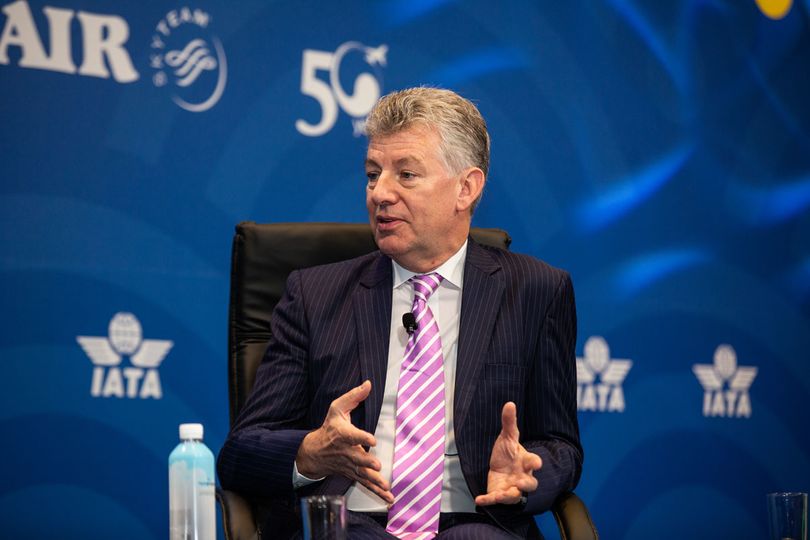Emirates trials 'passport-free travel' on Australia-London flights

Rustling up a passport and boarding pass to step onto an international flight could soon become a thing of the past, with Dubai Airport and its home airline Emirates planning to replace paper travel documents with biometrics as part of an upcoming trial.
The trial is set to take place on selected flights between Australia and London later this year. Automated facial recognition would replace document checks everywhere from the check-in desk and passport control counters through to duty-free shops, airport lounges and boarding queues, under the banner of 'One ID'.
This would include not only Dubai Airport, but also the airports taking part in the trial in Australia and in London, with biometrics replacing traditional travel documents from the start of the journey right until the very end.
Speaking at the International Air Transport Association (IATA) AGM and World Air Transport Summit in Seoul, Dubai Airports CEO Paul Griffiths explained that the ultimate goal is to expand biometrics across the globe using a single passenger identifier, so that ideally, the collection of data would only need to happen “once in any passenger’s lifetime.”
“We ran a trial between London Gatwick and Dubai… and we’re now trying to expand that,” Griffiths continues. “We learned from that trial that the technology works: the idea of a single identity applied in different locations works, and if we can make that work globally, that’s the intention.”
While neither Dubai Airport or Emirates Airline could currently confirm which Australian airport(s) are set to participate in the trial, the benefits for passengers are clear, outlines IATA Director General and CEO, Alexandre de Juniac.
“Every traveller will appreciate the convenience of getting from the curb to the gate without ever having to show a paper passport or boarding pass,” he shares.
“The vision for One ID is a paperless travel experience where passengers can fly around the world safely and securely using only their individual biometric data. This will be achieved using a trusted digital identity, biometric recognition technology, and a collaborative identity management platform accessible to various authorised stakeholders.”
One ID: but what about passenger privacy?
As with any collection of passenger data – be it informational or biometric – privacy also needs to be considered, particularly when it comes to striking a balance between the data that needs to be collected, and how that data is used.
Based on the previous trial of Emirates passengers jetting between Gatwick and Dubai, 82% of those who participated “had no issues in terms of sharing their data with a third party, provided that there was some consumer benefit from it,” Griffiths continues.
A large proportion of those passengers who welcomed the nature of the trial and were happy to share the appropriate data were “premium passengers” – those flying business class or first class – as well as regular travellers such as top-tier Emirates Skywards members.
These travellers in particular “dislike all the disruption of having to carry documentation around” as is currently standard practice the world over, with the trial also proving popular with under-25s who generally “felt no issues at all with privacy.”
Griffiths also highlights that the system being trialled wouldn’t simply share passengers’ personal information en masse: it would ideally be similar to using an ATM, where the focus is on identifying an individual, and determining whether they can proceed to the next stage of their journey, such as through a boarding gate.
“When you go to a bank ATM, you are not telling the machine what your net worth is and whether you’re good for $50: you are simply saying “here’s my card”.”
“The machine is then saying “is this personal good for $50?”. If it’s a red light, you don’t get the cash, and if it’s a green light, you get the cash… so with digital identity, we are simply asking … does he or she have a red or green light?”
One ID to help airports handle a growing number of travellers
With global aviation passenger numbers expected to double between now and 2037, according to IATA, One ID and the broader use of biometrics have the potential to not only reduce passenger processing times at airports, but also allow airports to handle more travellers than they do today.
“It is clear that we will not see an increase of 100% in existing infrastructure (by 2037), so it is important to get (One ID) right,” observes Gloria Guevara, President & CEO of the World Travel & Tourism Council, speaking also in Seoul.
“The most successful airports are those that don’t impose their product upon their customers for longer than they absolutely have to,” continues Dubai Airports’ Paul Griffiths.
“If you can get through an airport twice as quickly, you’re usually happier about that,” he concludes, underscoring the potential wins for both airports – in being able to process passengers faster, and thus, handle more travellers – and for the travellers themselves, who can reduce time spent on today’s usual airport formalities.
Chris Chamberlin attended the IATA AGM in Seoul as a guest of IATA.

12 Jun 2014
Total posts 71
Love it, bring it on.😍😍😍😍
Qantas - Qantas Frequent Flyer
10 Oct 2013
Total posts 111
“The most successful airports are those that don’t impose their product upon their customers for longer than they absolutely have to,” continues Dubai Airports’ Paul Griffiths.
05 Dec 2018
Total posts 147
He thinks everyone has a concierge and expedited security like himself 😊
15 Feb 2018
Total posts 43
I may be ignorant of such information, but will repeated exposure to one of these machines damage our eyes over time?
23 Jul 2018
Total posts 3
Just don't grow a beard while you are away. Did this once and the camera didn't recognise me so had to go to the desk anyway.
Singapore Airlines - KrisFlyer
14 Jan 2014
Total posts 340
Or put on to weight for that matter.. a chubby round face from a svelte chiselled jaw to start with can cause no end of trouble at immigration AND that’s just with a passport photo and actual people.. never mind a bloody machine!!
23 Aug 2011
Total posts 65
Probably won't be going via DXB if Trump starts a war with Iran.
Qantas - Qantas Frequent Flyer
20 Sep 2018
Total posts 5
all well and good, however airport satisfaction is judged on its weakest (read: most lengthy) link. Here's looking at you, Sydney & Melbourne baggage peeps.
Qantas - Qantas Frequent Flyer
02 Jul 2011
Total posts 1374
Interesting.
12 Dec 2012
Total posts 1031
The US passport card is only valid for ground crossings. It can't be used for air travel, even to the counrties that otherwise accept it for ground crossings.
07 May 2016
Total posts 17
12 Dec 2012
Total posts 1031
01 Apr 2014
Total posts 114
Great improvement, but what about boarding the actual aircraft? Won't cabin crew be looking for a boarding pass or similar to see seat assignments? The pax also need something as a reminder as to which seat they go to, unless they get given a small slip printed at the boarding gate like when you do QF domestic using a QR code on your phone.
02 Jul 2011
Total posts 61
Plus the staff at the gate usually want to check your passport again to make sure the boarding pass matches the passenger before they let you onto the aircraft. How will this work?
Qantas - Qantas Frequent Flyer
27 Nov 2017
Total posts 25
Qantas are already doing biometric boarding at LAX. No need to show your passport or boarding pass to enter the gate. A BP is still needed on the plane although that can be electronic too.
15 Feb 2018
Total posts 43
Agree with Himeno. I like the check in desks, talking to ground staff etc. I dislike intensely the automation forced on us by airlines and airports.
15 Feb 2013
Total posts 163
I just like getting a stamp in my passport too. Hated it when they got rid of the stamps in Australia (it was also good evidence for when the US lose your departure slip and think you never left)
Qantas - Qantas Frequent Flyer
03 Oct 2018
Total posts 6
The future is coming.
Qantas - Qantas Frequent Flyer
11 Oct 2014
Total posts 688
Fascinating discussion, based on all of the 'perceived' (not actual) benefits of facial recognition. However, the world is "working" in multiple different directions. On one side, we have the Chinese State-sponsored facial recognition program and its associated penalty points surveillance system - whilst on the other side, we have the USA city of San Francisco imposing a total city-wide ban on the use of facial recognition technology, based on significant proven flaws that show the inability to determine gender and struggles with an accurate identification of people of colour. A second city within the Boston precinct announced yesterday a similar ban for identical reasons.
How successful this Emirate's test will be should prove to be a valuable pointer. Given that, by nature, it will involve several governments (Australia, UAE and the UK at least), airline staff and the travelling public, the first sign of any significant glitches may have a distinct effect on the wider proliferation of such a move.
In other words, it isn't all champagne and roses yet. The proof will be in the pudding. Imagine being denied boarding at the airport for your business trip or leisure holiday based solely on a machine mis-identification. How this will be handled will be crucial to the travelling public.
05 Oct 2017
Total posts 526
05 Oct 2017
Total posts 526
BTW while I don't like all the intrusiveness into my personal life that East Asian countries make just because I'm a foreigner (I don't believe Australia has any registration requirements for foreigners residing temporarily in Australia) I also am equally concerned about this "big brother" approach to travel that Dubai airport is doing. I still prefer traditional boarding passes and don't see any problems producing a passport for international travel. it's like reinventing the wheel - if it ain't broke, don't fix it. Yes certain things can and should be streamlined, but as we've seen with the outbound e-passport system being down due to glitches at Australian airports, too much technology can become a dangerous thing.
Hi Guest, join in the discussion on Emirates trials 'passport-free travel' on Australia-London flights